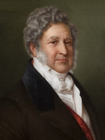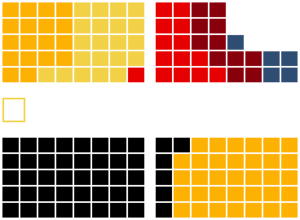Lagerhuis elections, 1684: Difference between revisions
No edit summary |
mNo edit summary |
||
| (3 intermediate revisions by 2 users not shown) | |||
| Line 5: | Line 5: | ||
| type = parliamentary | | type = parliamentary | ||
| ongoing = no | | ongoing = no | ||
| previous_election = 1680 | | previous_election = Lagerhuis elections, 1680 | ||
| previous_year = | | previous_year = 1680 | ||
| next_election = Lagerhuis elections, 1685 | | next_election = Lagerhuis elections, 1685 | ||
| next_year = | | next_year = 1685 | ||
| seats_for_election = All 150 seats to the [[Lagerhuis]] <br> '''76 seats''' needed for a majority | | seats_for_election = All 150 seats to the [[Lagerhuis]] <br> '''76 seats''' needed for a majority | ||
| election_date = 20.XV.1684 | | election_date = 20.XV.1684 | ||
| Line 118: | Line 118: | ||
}} | }} | ||
The '''Lagerhuis elections of 1684''' were a heavily contested election. The [[Radicalen]] were blamed to have | The '''Lagerhuis elections of 1684''' were a heavily contested election. The [[Radicalen]] were blamed to have abused the influence of the King, [[Arkadius IV]], to win the elections. Gerrymandering, which had become a pretty common practice during the Sixth Kingdom, further ensured the dominance of a strong political faction in support of uncurtained powers for the King and his Franco-Batavian dreams. | ||
The Montrarde cabinet of [[Jacques Montrarde]] remained in power, with support of the Radicalen and [[CMP]]. The successes of the CMP in fulfilling their promises, made them the major party within the coalition. Talks about Benjamin Cambernon becoming the new prime minister were eventually shut down as tensions increased and the Lagerhuis believed that a military man would be better placed to handle any possible revolts. As the year passed, Montrarde successfully kept his coalition partner at bay by making promises of further reforms. Going against his own party's policies, he delayed his expansion and reform of the military. | The Montrarde cabinet of [[Jacques Montrarde]] remained in power, with support of the Radicalen and [[CMP]]. The successes of the CMP in fulfilling their promises, made them the major party within the coalition. Talks about Benjamin Cambernon becoming the new prime minister were eventually shut down as tensions increased and the Lagerhuis believed that a military man would be better placed to handle any possible revolts. As the year passed, Montrarde successfully kept his coalition partner at bay by making promises of further reforms. Going against his own party's policies, he delayed his expansion and reform of the military. | ||
All went reasonably well while the popular King remained in power: protests were few, and any hardships were seen as temporary setbacks. It was only when the King retired from power after the [[Amokolian Revolution]], opposition demanded new elections. The renewed social tensions led to a new election in 1685 AN and the outbreak of the [[Batavian Revolution]]. | All went reasonably well while the popular King remained in power: protests were few, and any hardships were seen as temporary setbacks. It was only when the King retired from power after the [[Amokolian Revolution]], opposition demanded new elections. The renewed social tensions led to a new election in 1685 AN and the outbreak of the [[Batavian Revolution]]. | ||
[[category:Lagerhuis]] | |||
Latest revision as of 22:05, 21 July 2024
| |||||||||||||||||||||||||||||||||||||||||||||||||||||||||||||||||||||||||
| |||||||||||||||||||||||||||||||||||||||||||||||||||||||||||||||||||||||||
| Turnout: 453,156 voters | |||||||||||||||||||||||||||||||||||||||||||||||||||||||||||||||||||||||||
| |||||||||||||||||||||||||||||||||||||||||||||||||||||||||||||||||||||||||
The Lagerhuis elections of 1684 were a heavily contested election. The Radicalen were blamed to have abused the influence of the King, Arkadius IV, to win the elections. Gerrymandering, which had become a pretty common practice during the Sixth Kingdom, further ensured the dominance of a strong political faction in support of uncurtained powers for the King and his Franco-Batavian dreams.
The Montrarde cabinet of Jacques Montrarde remained in power, with support of the Radicalen and CMP. The successes of the CMP in fulfilling their promises, made them the major party within the coalition. Talks about Benjamin Cambernon becoming the new prime minister were eventually shut down as tensions increased and the Lagerhuis believed that a military man would be better placed to handle any possible revolts. As the year passed, Montrarde successfully kept his coalition partner at bay by making promises of further reforms. Going against his own party's policies, he delayed his expansion and reform of the military.
All went reasonably well while the popular King remained in power: protests were few, and any hardships were seen as temporary setbacks. It was only when the King retired from power after the Amokolian Revolution, opposition demanded new elections. The renewed social tensions led to a new election in 1685 AN and the outbreak of the Batavian Revolution.






